
This week every picture...Matthew Lindsay pays tribute to Celtic midfield legend Bobby Collins who died last week, aged 82.
STARTING OUT:
I GREW up in Polmadie on the south side of Glasgow.
I joined Pollok Juniors when I was 16. I was spotted playing for them by Everton and they soon tried to sign me when I was 17. I even went down to Liverpool to see the set-up there and was ready to move to England.
However, the day before I was due to leave, the Celtic manager, Jimmy McGrory, approached me and asked to sign me. I couldn't believe it.
But I had been something of a Celtic supporter and agreed to sign for them. I joined when I was 17 in 1948. This picture shows me jumping for joy in training.
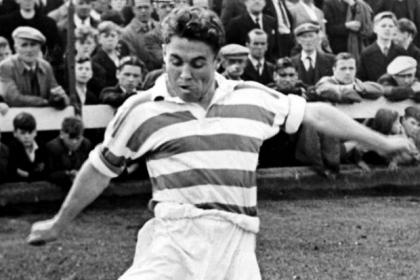
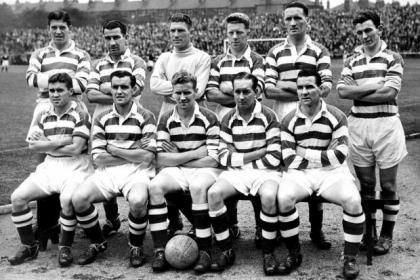
A CELTIC STAR:
I HAD never seen Jimmy McGrory play, but my father had seen him in his heyday in the 1920s and 1930s and told me what a marvellous striker he was and about all the wonderful goals he scored.
He was all right and we got on fine. But he was not what you would term a coach. He didn't say an awful lot to his players.
My first game was a tough one - it was against Rangers. But we won it. I was up against Jock "Tiger" Shaw and had a smashing game. I went out there thinking: "I'm going to run that old so-and-so into the ground." It was the perfect start to my career. The first picture here shows me in action for Celtic.
I must be honest, the Old Firm game never meant anything to me. Not in the way it does with some fans. My father was a Catholic and my mother was a Protestant. I grew up as a Protestant.
But there were more Protestants than Catholics at Celtic back then. Willie Fernie was another one. And Jock Stein, too. Rangers, of course, had a different attitude for many, many years.
The second picture here shows me in a Celtic team in 1955. We are, back row from left to right: Mick Haughney, Sean Fallon, Johnnie Bonnar, Bobby Evans, Jock Stein and Bertie Peacock. In the front row, from left to right, are myself, Willie Fernie, Johnnie Walsh, Charlie Tully and Neilly Mochan. That was a smashing team.
Jock was a great pal of mine. He would go on to become a brilliant manager and lead Celtic to years of unprecedented success.
But he was an outstanding player as well. When he came into the side he rejuvenated us. He was left-footed and slotted in well on that side of the park, was excellent in the air and was a good passer.
We fed off him and started to win things again. Sean Fallon worked as his assistant and he was a great bloke, too. He was a different kind of player altogether. When he went in for a tackle he really went in for a tackle. It was just the way he played. You have to have somebody who can look after himself on your side.
I had attended Old Firm games as a supporter when I was a youngster and had been taken aback by how ferocious things could get off the park. Nothing ever really happened at the matches.
But afterwards there were always unpleasant incidents away from the grounds.
I played against the likes of George "Corky" Young, Ian McColl, Sammy Cox, and goalie Bobby Brown.
Honestly, if these guys were playing the game today every one of them would be worth millions and millions of pounds. That is no exaggeration.
Although he was a Rangers man through and through, one of the best pals I ever had was the great George Young.
I met him through the Morton manager, Hal Stewart. He used to run Co-operative Cigarettes functions. As a payment for turning up, players got a few quid and as many fags as you could smoke. Hal was such a good fellow.
We defeated our arch rivals Rangers by a record 7-1 scoreline in the final of the League Cup in 1957. And they were lucky as well - I hit the crossbar twice. Still, we were quite happy with the result.
It was voted as being the Parkhead club's greatest ever Old Firm victory.
It is the sort of game where that can happen. Celtic have beaten Rangers by big scorelines and vice-versa.
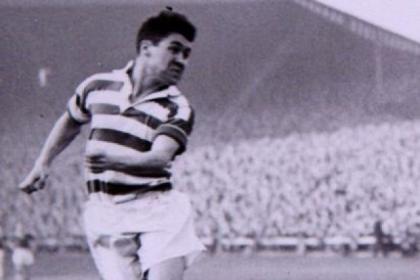
EUROPE DENIED:
WE won the League Championship, the League Cup and the Scottish Cup during my time. This picture shows me in domestic action against Clyde at Parkhead.
But we weren't allowed to represent Scotland in the European Cup.
The Hibs chairman at the time was on the SFA Committee and they were put forward to play in it instead, and they reached the semi-final as well.
It was such a massive disappointment not being allowed to go and play over there.
The hardest game I ever played in was against European opposition in 1950. We played Lazio in Rome in what was meant to be a friendly. But they were just vicious.
They kicked lumps out of me. We gave as good as we got but when we got them back to Parkhead we annihilated them.
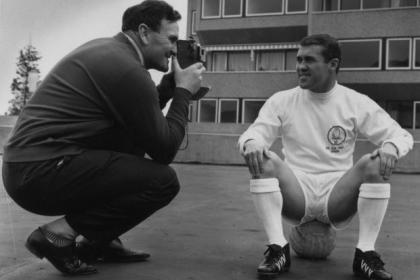
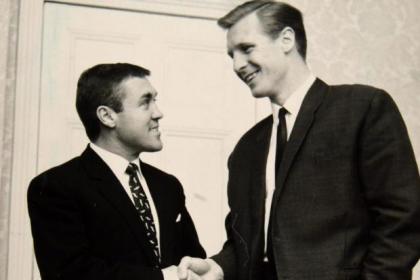
TIME TO MOVE ON:
I LEFT Celtic after nine years there in 1957. The reason was simple - they wanted rid of me. I moved to Everton for about £25,000. I wasn't particularly happy about the transfer.
But I did well and stayed for five years. Every time I went to a team, it seems to me, they've been in serious difficulty at the bottom of the league.
It was true with Everton and also when I went to Leeds United in 1962.
Later on in my career, I went to Bury and it was a similar scenario.
With Leeds, though, it was the Second Division they were propping up. As with Everton, I helped to turn it around.
My attitude always centred around winning. That, after all, is the point in playing.
I got a reputation for being a dirty this or a dirty that. What a lot of nonsense!
Sure, I could look after myself - I had to - but I never started a fight in my life. Not once.
The players were just not good enough at Leeds. But, slowly but surely, some talented young players, including some from Scotland like Eddie Gray, Billy Bremner and Peter Lorimer, started to emerge.
Leeds won promotion to the First Division in my first season. In the next campaign, we reached the FA Cup final and just missed out on winning the league title on goal average.
But it was still a remarkable turnaround to go from being second bottom of the Second Division to that level within two years.
The Leeds manager, Don Revie, can be seen filming me in this photograph. He was an exceptional manager.
The thing with managers is that if you play well you are fine, if you play badly you are in the doghouse. I was one of the few experienced players he used in the side.
To be named as the Football Writers' Player of the Year in 1965 was something I'd always wanted. I was the first Scot to pick up the prize in England. This second picture shows me shaking hands with the Celtic captain, Billy McNeill, that year.
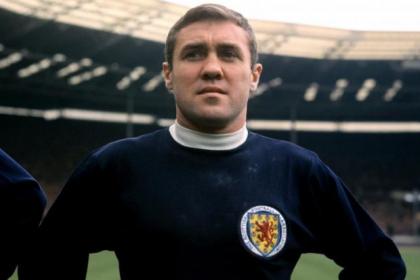
SCOTLAND CAREER:
MY success with Leeds led to me being recalled to the Scotland set-up in 1965 after a six-year absence.
I came back and played against England, Poland and Spain. This picture shows me before a game against England at Wembley.
I played against England three times in my international career. But I always played them down at Wembley - in 1957, 1959 and 1965 - and was never on a winning side. But it was a tremendous match to be part of. The crowds were massive - we used to get 125,000 for a game.
The first time I played for Scotland was against Wales down at Ninian Park back in 1952 when I was only 19 or 20. We won 2-1.
There was no manager as such in those days. But I think that was the match that Matt Busby came in and took charge.
I scored quite a lot of goals for Scotland. In fact, one of the best goals I ever scored was against West Germany in 1957 when we triumphed 3-1.
I also netted a beauty against a good Polish team. I think that, in total, I scored 12 goals in 31 games. That's not a bad ratio.
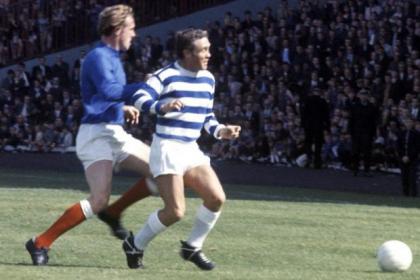
A PERFECT ENDING:
I SPENT seven years at Leeds and then left to go to Bury in 1969. After two years there I moved on to play for Morton.
My last game in Scotland was against Rangers for Morton at Ibrox. We won 2-0 and I scored the second goal. I can remember their right-back got the ball.
Their manager, Willie Waddell, was shouting at him: 'Don't pass it back! Don't pass it back!' But he obviously didn't hear the instruction because he passed it back and I picked up the ball.
I rounded the keeper and had an empty net to put the ball into. I thought: 'Will I just tap it in? Oh, what the hell!'
So I hammered it. It was a nice way to finish off my career in Scotland. This picture shows me running for the ball with Colin Stein.
After that, it was on to Oldham, where I played for a bit and coached as well. Believe it or not, we actually won promotion from Division Three.
I went to Lilleshall in Leeds to do my coaching badges when I was a player and I managed Huddersfield, Hull City and Barnsley.
TIMES FILE ... BOBBY COLLINS
1948 - Joins Celtic aged 17. Makes first-team debut against Rangers.
1951 - Helps Celtic win Scottish Cup with 1-0 victory over Motherwell. Wins first of 31 caps for Scotland against Wales.
1954 - Is mainstay of the side as the Hoops win the League title for the first time in 16 years.
1957 - Hits the bar twice as Celtic inflict a record 7-1 win over Rangers in the League Cup Final. Leaves Celtic after nine years
and crosses the border to join Everton for £25,000.
1963 - Moves to English Second Division strugglers Leeds United.
1965 - Misses out on winning English First Division title on goal difference. Loses FA Cup Final to Liverpool. Recalled for Scotland after six-year exile.
1969 - Moves to Bury after picking up knee injury in European match.
1971 - Finishes career in Scotland by scoring second goal in 2-0 win for Morton at Rangers.
Readers who submit articles must agree to our terms of use. The content is the sole responsibility of the contributor and is unmoderated. But we will react if anything that breaks the rules comes to our attention. If you wish to complain about this article, contact us here
Readers who submit articles must agree to our terms of use. The content is the sole responsibility of the contributor and is unmoderated. But we will react if anything that breaks the rules comes to our attention. If you wish to complain about this article, contact us here


Comments & Moderation
Readers’ comments: You are personally liable for the content of any comments you upload to this website, so please act responsibly. We do not pre-moderate or monitor readers’ comments appearing on our websites, but we do post-moderate in response to complaints we receive or otherwise when a potential problem comes to our attention. You can make a complaint by using the ‘report this post’ link . We may then apply our discretion under the user terms to amend or delete comments.
Post moderation is undertaken full-time 9am-6pm on weekdays, and on a part-time basis outwith those hours.
Read the rules hereComments are closed on this article